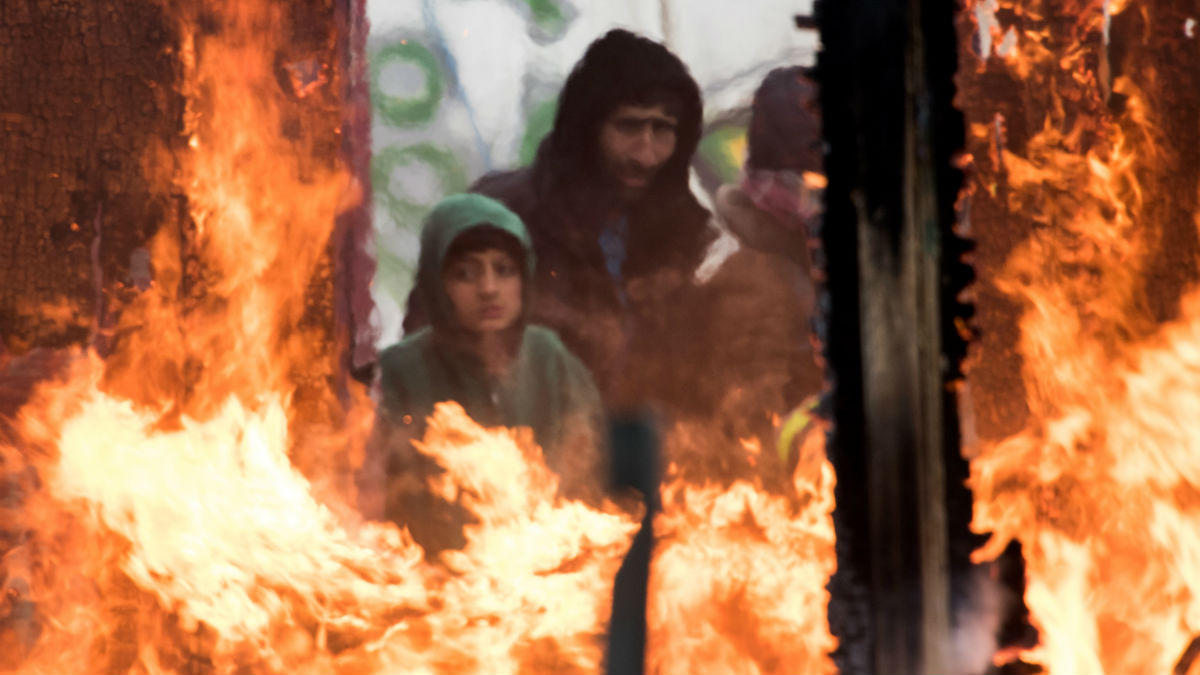Refugee crisis: Calais Jungle children 'have nowhere to sleep'
Around 100 youngsters left in refugee camp after French demolition crews tear down tents and shelters

A free daily email with the biggest news stories of the day – and the best features from TheWeek.com
You are now subscribed
Your newsletter sign-up was successful
Royal Navy to intercept refugee boats heading to Europe
7 March
The Royal Navy is to join a multi-nation operation in the Mediterranean to crack down on the people-smugglers responsible for bringing thousands to Europe.
Three ships - the RFA Mounts Bay, an amphibious landing vessel with a Wildcat helicopter on board, and two cutters from the UK Border Force - will take their place alongside boats from Germany, Canada, Turkey and Greece as part of the Nato flotilla stationed in the Aegean Sea.
The Week
Escape your echo chamber. Get the facts behind the news, plus analysis from multiple perspectives.

Sign up for The Week's Free Newsletters
From our morning news briefing to a weekly Good News Newsletter, get the best of The Week delivered directly to your inbox.
From our morning news briefing to a weekly Good News Newsletter, get the best of The Week delivered directly to your inbox.
They will monitor the waterway for signs of boats carrying illegal migrants and refugees from Syria to Turkey and Greece and notify the Turkish coastguard to intercept them.
The decision to deploy Royal Navy assets represents an escalation of British involvement in the crisis. Announcing the move yesterday, Prime Minister David Cameron said that "where we can help, we should".
He added: "We've got to break the business model of the criminal smugglers and stop the desperate flow of people crammed into makeshift vessels from embarking on a fruitless and perilous journey."
Hundreds have drowned on the perilous crossing to Europe after paying human traffickers for a place on a boat or dinghy.
A free daily email with the biggest news stories of the day – and the best features from TheWeek.com
Cameron's announcement comes as Turkish leaders join European leaders in Brussels today for an emergency summit on the refugee crisis. An estimated 3,000 people arrive on Turkey's shores every day and the country has repeatedly warned it can no longer cope with the situation.
Last year, the majority of the one million refugees and migrants who entered the European Union came via Turkey, the BBC reports. The EU is hoping to stem this tide and regain control of its borders by offering Turkey €3bn (£2.3bn) to keep economic migrants in the country.
Last week, European Council President Donald Tusk told those considering making the journey to Europe that only economic migrants would not be allowed to remain.
"Do not believe the smugglers," he warned. "Do not risk your lives and your money. It is all for nothing."
-
 Local elections 2026: where are they and who is expected to win?
Local elections 2026: where are they and who is expected to win?The Explainer Labour is braced for heavy losses and U-turn on postponing some council elections hasn’t helped the party’s prospects
-
 6 of the world’s most accessible destinations
6 of the world’s most accessible destinationsThe Week Recommends Experience all of Berlin, Singapore and Sydney
-
 How the FCC’s ‘equal time’ rule works
How the FCC’s ‘equal time’ rule worksIn the Spotlight The law is at the heart of the Colbert-CBS conflict
-
 Epstein files topple law CEO, roil UK government
Epstein files topple law CEO, roil UK governmentSpeed Read Peter Mandelson, Britain’s former ambassador to the US, is caught up in the scandal
-
 Iran and US prepare to meet after skirmishes
Iran and US prepare to meet after skirmishesSpeed Read The incident comes amid heightened tensions in the Middle East
-
 Grok in the crosshairs as EU launches deepfake porn probe
Grok in the crosshairs as EU launches deepfake porn probeIN THE SPOTLIGHT The European Union has officially begun investigating Elon Musk’s proprietary AI, as regulators zero in on Grok’s porn problem and its impact continent-wide
-
 Israel retrieves final hostage’s body from Gaza
Israel retrieves final hostage’s body from GazaSpeed Read The 24-year-old police officer was killed during the initial Hamas attack
-
 China’s Xi targets top general in growing purge
China’s Xi targets top general in growing purgeSpeed Read Zhang Youxia is being investigated over ‘grave violations’ of the law
-
 Panama and Canada are negotiating over a crucial copper mine
Panama and Canada are negotiating over a crucial copper mineIn the Spotlight Panama is set to make a final decision on the mine this summer
-
 Europe moves troops to Greenland as Trump fixates
Europe moves troops to Greenland as Trump fixatesSpeed Read Foreign ministers of Greenland and Denmark met at the White House yesterday
-
 Why Greenland’s natural resources are nearly impossible to mine
Why Greenland’s natural resources are nearly impossible to mineThe Explainer The country’s natural landscape makes the task extremely difficult